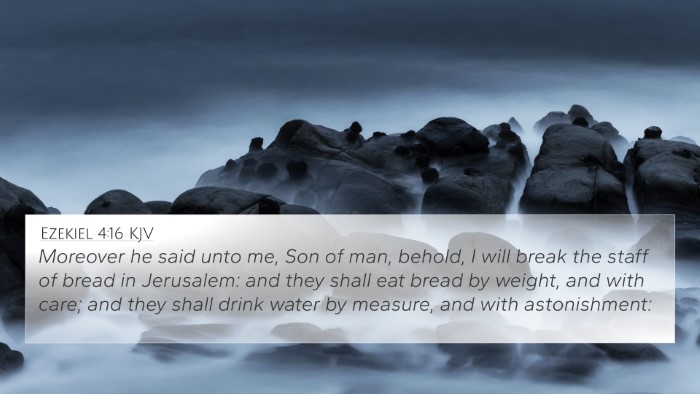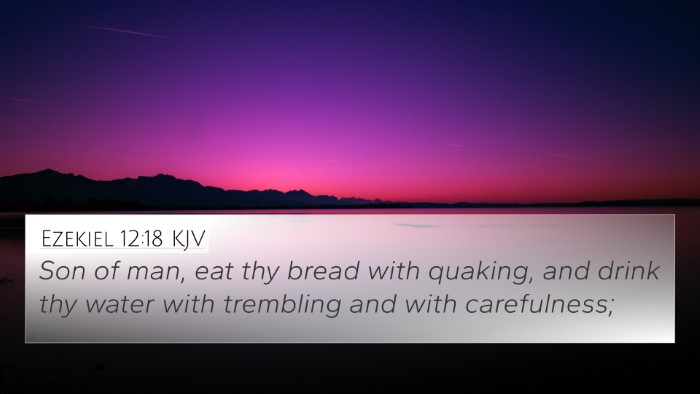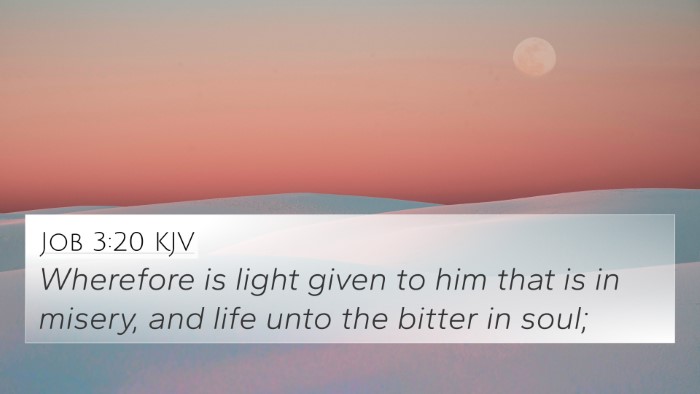Understanding Job 21:25
Job 21:25 states, "And another dieth in the bitterness of his soul, and never eateth with pleasure." This verse highlights the different fates people experience, particularly how some may die in despair while others enjoy life. In this context, Job is responding to his friends who claim that suffering is a direct result of sin, which opens up a broader exploration of the themes of suffering, justice, and the human condition.
Verse Analysis and Commentary Insights
This verse delves into the complexity of human suffering and the apparent injustices observed in life. Below is an exploration of Job 21:25 through insights drawn from public domain commentaries:
- Matthew Henry: In his commentary, Henry suggests that Job observes the harsh reality of existence, where not all individuals experience the consequences of their deeds in equal measure. He highlights the ‘bitterness of soul’ as an indication of profound grief and anguish, demonstrating that one's end is not always a reflection of their life choices.
- Albert Barnes: Barnes emphasizes the idea that death does not come equally to all, nor does it come solely as a punishment for sin. He notes that Job's statement serves to challenge the prevailing notion of retributive justice, indicating that some who live righteously may suffer greatly while others who are wicked find success.
- Adam Clarke: Clarke points out that the phrase 'never eateth with pleasure' implies that there are those whose lives are filled with distress and who find no joy in even the simplest of pleasures. This serves to highlight the disparity in human experiences, framing the verse within the conversation regarding theodicy and the question of divine justice.
Key Themes and Connections
The deeper meanings found in Job 21:25 connect to several significant themes, including:
- The Problem of Evil: This verse symbolizes the struggle with understanding why bad things happen to good people.
- The Nature of Suffering: Job points to the existential aspect of suffering, where anguish can exist regardless of one's moral standing.
- Divine Justice: The assertion here is a challenge to simplistic views of divine retribution, suggesting that life’s outcomes are far more complex.
Bible Cross-References
When exploring Job 21:25, various cross-references enrich the understanding of this text:
- Ecclesiastes 9:2: "All things come alike to all: there is one event to the righteous, and to the wicked."
- Psalm 73:3-5: Highlights the psalmist's struggle with the prosperity of the wicked and suffering of the righteous.
- Psalm 88:3: Expressions of deep anguish capture the bitter state of a soul in despair.
- Note on Lazarus - Luke 16:19-31: Rich man and Lazarus, reflecting on divergent fates after death.
- Jeremiah 12:1: A conversation about the prosperity of the wicked and the suffering of the righteous.
- 2 Corinthians 5:10: "For we must all appear before the judgment seat of Christ," indicating an ultimate divine justice beyond earthly perception.
- Romans 8:18: Discusses the present sufferings of the believer not being worthy compared to future glory.
Conclusion
Job 21:25 serves as a critical reminder of the complexity of life's circumstances and the often paradoxical nature of human experiences. By analyzing this verse through the insights provided by respected biblical commentators and linking it with related scriptures, we gain a broader understanding of enduring themes such as suffering, justice, and the human condition.
Using Bible Cross-References
In studying the Bible, cross-referencing verses such as Job 21:25 allows for a deeper understanding of scripture, fostering a comprehensive view of God's word.
Tools for Bible Cross-Referencing
- Utilizing a Bible concordance can provide a pathway to finding related verses.
- Employing a Bible cross-reference guide helps connect disparate parts of scripture.
- Engaging in cross-reference Bible study can lead to richer theological insights.
Implementing Cross-Referencing in Study
Knowing how to properly implement cross-referencing techniques enhances one’s study and comprehension of Biblical themes. Identifying connections between Old and New Testament narratives is essential for drawing parallels and understanding deeper revelatory truths.
Examples of User Intent with Cross-Referencing:
- What verses are related to Job 21:25?
- How do Job 21:25 and Ecclesiastes 9:2 connect?
- Find cross-references for Job 21:25 that highlight the theme of suffering.














